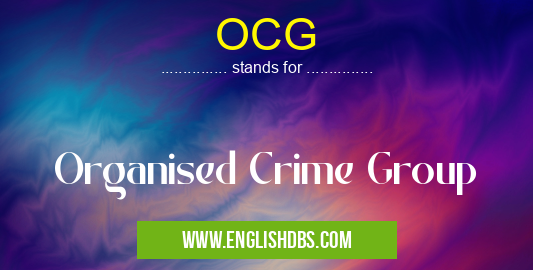What does OCG mean in POLICE
Organised Crime Group (OCG) is an umbrella term used by governmental organisations across the world to describe a range of criminal groups or networks. The activities of OCGs vary from country to country, but they often involve tax evasion and money laundering. They may also be involved in drug trafficking, human trafficking, fraud, and other illicit activities. OCGs are known to operate on a large scale and are capable of having an enormous impact on economies and society at large.

OCG meaning in Police in Governmental
OCG mostly used in an acronym Police in Category Governmental that means Organised Crime Group
Shorthand: OCG,
Full Form: Organised Crime Group
For more information of "Organised Crime Group", see the section below.
» Governmental » Police
Definition
An Organised Crime Group is defined as an association of three or more persons that has a common purpose of committing criminal acts for personal gain or profit. The group operates through a hierarchical structure of command and control, with a leader exercising complete authority over its members. OCGs may also have access to sophisticated weapons and technologies which can be used to carry out their illegal activities.
Impact
Organised crime groups pose a serious threat to economies around the world due to their involvement in illicit activities such as money laundering, drug trafficking, human trafficking, extortion, fraud, counterfeiting goods etc. These activities can lead to a decrease in taxes collected by governments and therefore less investment into public services such as health care or education. In addition, these criminal organisations have been linked with violence and intimidation tactics which have led to fear amongst local populations in many areas.
Prevention & Control Measures
Governments across the world have implemented measures designed to prevent organised crime groups from operating within their borders. This includes laws prohibiting certain types of criminal activity as well as harsher punishments for those found guilty of such crimes. Law enforcement agencies also work closely with international organisations such as Interpol and Europol to combat cross-border crimes committed by OCGs. Additionally, tighter border controls combined with intelligence-sharing between countries can help reduce the risk posed by these criminals groups.
Essential Questions and Answers on Organised Crime Group in "GOVERNMENTAL»POLICE"
What is an Organised Crime Group?
An Organised Crime Group (OCG) is a group of criminals who coordinate activities such as fraud, embezzlement, extortion and illegal drug trafficking. They usually operate with a hierarchical structure and pool resources to produce illegal profits.
How can you identify an OCG?
OCGs do not have one particular method of operation, but there are some common indicators that can be used to identify them. These include the interdependence of members, a high level of organizational discipline, the use of violence or threats to maintain control and hierarchical structures in which orders are passed down from the top.
What kinds of activities do OCGs engage in?
Organised crime groups are involved in many different types of criminal activities, such as money laundering, extortion, drug trafficking, human trafficking, counterfeiting and others.
How does an OCG benefit its members?
OCGs provide their members with increased wealth, power and influence. They also offer protection from law enforcement by using tactics such as bribery and intimidation. By pooling resources together they can also reduce risk by diversifying their operations across different countries if applicable.
Do OCGs exist outside of organised crime?
Yes - although they may have their roots in organised crime originally, some OCGs have since branched out into other illicit activities such as fraud or terrorism.
Are there any legal differences between organised crime groups and gangs?
While some gangs may be considered informal entities with comparatively less organized structures than established organised crime groups they may still be constituted by certain laws depending on where they operate geographically. As for what differences that would entail however would depend on the specific situation involved.
Is there a way to prevent people from joining an OCG?
As mentioned previously these groups tend to draw on individuals for a variety of reasons and therefore it would be difficult to completely prevent someone from joining one if they wished to do so. However measures could be taken to help dissuade people at risk by giving them more constructive alternatives through mentorship or vocational training opportunities.
Can law enforcement take down an OCG?
Law enforcement agencies often work together internationally to tackle large-scale criminal networks such as those run by organised crime groups (OCGs). Depending on the size and scope of each individual case investigations can vary greatly but ultimately any successful prosecution needs sufficient evidence in order for action to be taken.
How has technology impacted modern day organised crime groups?
The rise in technology has had both positive and negative effects on modern day organisations crime groups (OCGs). On one hand it allows them access to new markets thanks to the global reach made possible through the internet while on the other hand it makes it easier for law enforcement agencies track their activities online.
Final Words:
Organised crime groups present increased risks both domestically and internationally due to their involvement in various illegal activities that directly harm citizens’ wellbeing as well as economies around the world. Governments are utilizing both legislative measures as well as international collaboration initiatives between law enforcement agencies in order to reduce these threats posed by these criminal organisations.
OCG also stands for: |
|
| All stands for OCG |
